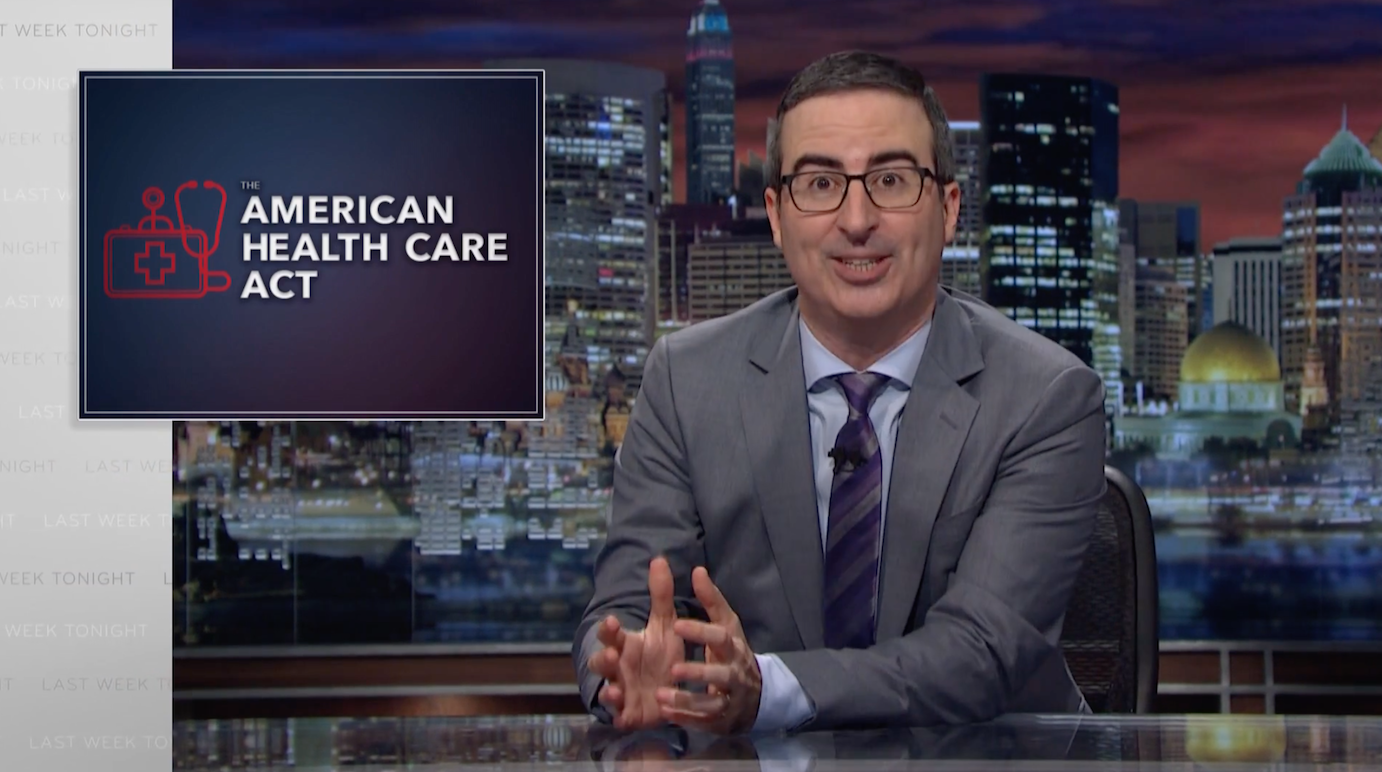
John Oliver used the feature segment of Sunday's episode of Last Week Tonight to pick apart the American Health Care Act—also known as the Republicans' controversial answer to Obamacare—that is currently making its way through the House of Representatives. Breaking down the new plan is a good idea, because as President Donald Trump recently discovered, health care can be confusing: "We have come up with a solution that I think is really, really—I think very—good," he said of the AHCA. "It's an unbelievably complex subject. Nobody knew that health care could be so complicated."
As Oliver points out, the bill has been widely panned, with many complaining that it is just a worse version of Obamacare. The American Medical Association, American Hospital Association, American Nurses Association and the AARP have all denounced it. Democrats hate it. Many Republicans hate it. Even Breitbart hates it. "This bill seems almost universally hated in Washington," says Oliver. "It is truly the Ted Cruz of health care legislation."
Despite all of the criticism, there is still a good chance the AHCA will pass, which means we should probably familiarize ourselves with it. According to Oliver, there are two major ways in which it differs from the Affordable Care Act, or Obamacare.
Related: John Oliver details the anatomy of Trump's falsehoods
TAX CREDITS
Both the ACA and the AHCA offer tax credits to help Americans afford health care. The ACA tax credit depended mostly on income and the relative cost of a state's insurance premiums. The lower the income, the larger the tax credit. The new Republican plan features a flat tax credit based on age. Americans under 30 years of age would receive a $2,000 credit, while Americans over 60 would receive a $4,000 credit. "The older you get, the more money you get," says Oliver, "which is the exact opposite of being a woman in Hollywood."
MEDICAID
"We are defederalizing an entitlement, block granting it back to the states and capping its growth rate," House Speaker Paul Ryan told the radio talk show host Hugh Hewitt of how the AHCA would handle Medicaid. "What that means in layman's terms," Oliver says, "is cutting the living shit out of Medicaid."
According to an analysis by the Center on Budget and Policy Priorities, the AHCA would over the next 10 years shift $370 billion in Medicaid costs to the states. This means the states are going to have to make up the deficit. If they can't—and many won't—the most disadvantaged Americans aren't going to be able to receive the care they need.
WHO DOES THIS HURT THE MOST?
The S&P estimates that 6 million to 10 million people will lose coverage as a result of the AHCA. Brookings estimates that at least 15 million will lose coverage. So the plan hurts Americans in general, but it hits poor Americans the hardest. In other words, it hurts many Trump voters the hardest. According to The New York Times, Americans who will be eligible for $5,000 less in tax cuts under the AHCA voted for Trump by a margin of 59 percent to 36 percent. "It's like if the people of Pompeii voted for the volcano," says Oliver.
WHO DOES THIS HELP THE MOST?
You guessed it: rich people. The biggest tax breaks the AHCA offers would go to the wealthy, with the top 1% averaging a break of $33,000, while the top 0.1% would average a break of $197,000. Even Tucker Carlson confronted Ryan over all the money the AHCA stands to send to the rich. "Kind of a hard sell to say, 'Yeah we're going to repeal Obamacare but we're going to send more money to the people who have already gotten the richest over the last 10 years,'" Carlson said. "That's what this does, no? I'm not a leftist, but that's true."
Ryan's only response to this question and throughout the course of the interview was to say the GOP said it was going to repeal the Obamacare taxes and this is one of them. Oliver doesn't need to obfuscate in his explaination: "This plan is literally taking money from the very poor and giving it to the very rich."
WHAT ABOUT TRUMP?
Trump hasn't been heavily involved in the promotion of the AHCA. One of the reasons, according to Oliver, is that he probably hasn't even read it. Another is that a lot of what he promised in regard to health care did not make it into the bill. Trump promised competition between states, but the AHCA does not promote buying plans across state lines.
As Oliver points out, though, this is an idea that is nice to talk about, but hard to implement. Wyoming, Maine and Georgia all currently allow people to buy plans across state lines, but as The New York Times points out, no one has taken up the offer: It's just too difficult for an insurance provider to set up networks of doctors and hospitals in other states.
This is one of many problems with the AHCA. According to Oliver, though, the bottom line is clear: The plan is going to "increase costs for older and poorer Americans and cause millions of Americans to lose coverage." If it passes, at least Americans can take solace in knowing that the wealthiest 1% are getting the tax breaks they deserve. Everyone else will, as Utah Representative Jason Chaffetz suggested, just have to learn to live without their fancy iPhones.
Uncommon Knowledge
Newsweek is committed to challenging conventional wisdom and finding connections in the search for common ground.
Newsweek is committed to challenging conventional wisdom and finding connections in the search for common ground.
About the writer
Ryan Bort is a staff writer covering culture for Newsweek. Previously, he was a freelance writer and editor, and his ... Read more
To read how Newsweek uses AI as a newsroom tool, Click here.








